I’ve been watching Johannesburg slowly die for years. So nothing in a recent Financial Times piece about the city’s decline was new to me. It just felt like personal laundry being aired. I’m quite sure global investors are well aware of problems in South Africa, but the FT exposed raw and growing wounds that I feel every day. Infected things that a part of me would rather keep secret. Another part of me is glad this devastation is being publicised. People should see this. It may jolt them into action to prevent this happening where they live.
Requiem for a city
Joburg’s pavements are crumbling. The electricity in people’s homes goes off multiple times a day unless you’ve installed a backup system. Some roads are more pothole than tarmac. And if you live here, you will be a victim of violent crime sooner or later. I can’t think of a friend or family member who hasn’t had a gun pointed at their face. I experienced that early last year.
Our homes are surrounded by 15-foot electric fences. Neighbourhoods are patrolled by private, heavily armed security. We rarely venture out late at night. By day, we do our best to navigate between safe havens. From home to a gleaming Virgin Active gym. Then perhaps to work in one of the shining Canary Wharf-like office towers of Sandton. Then, if you’re lucky, back home in the afternoon to a gated security estate.
I wrote most of this piece from a co-working space in Melrose Arch, a plush, multi-use, multi-billion rand precinct in the northern suburbs. There are no potholes here. Generators kick in when state electricity runs out. It amounts to a fake European village, with designer cobblestones to match. Some people rarely leave this little enclave – it has apartments, offices, restaurants, doctors and shops. Boutique stores sell designer clothes. And you can pick up a Bentley or Ferrari from the adjacent showrooms. You’ll just have to live with the stress of driving around in a mobile fortune with a target painted on its back – Joburg is a hijacking and kidnapping hub. You’d be better off with one of the bulletproof cars more and more families are choosing.
All the while, the ANC (African National Congress) Government plays the role of the wounded knight in Monty Python and the Holy Grail – “Tis but a scratch!” – while one arm lies severed. In fact, the ruling party seems very proud of its role in the destruction of South Africa. President Cyril Ramaphosa recently boasted that just two million South Africans were on state welfare in the late 1990s – that figure is now 18 million. He reckons that is progress. This reflects the ANC’s socialist roots. The party was close friends with the Soviets back in the day. It helps to explain an (official) unemployment rate of about one in three. The actual rate is probably much higher than that.
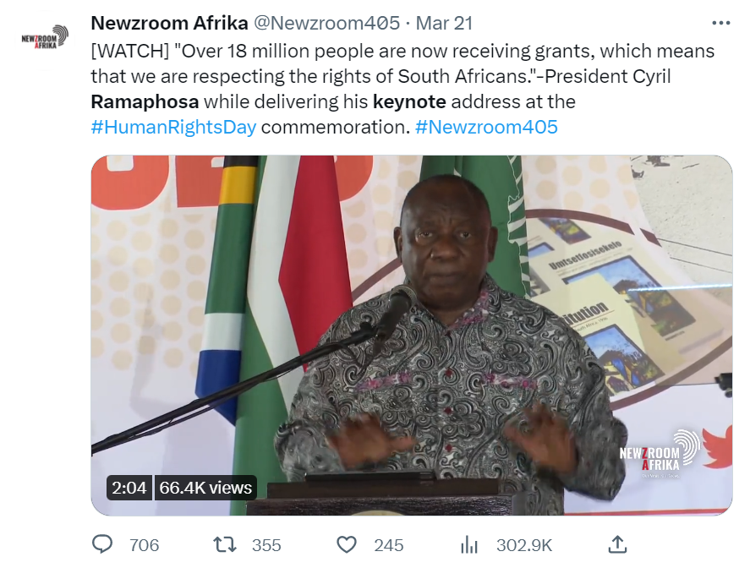
Woke by any other name
Nelson Mandela’s book, Long Walk to Freedom, accurately described the past, but failed to predict the future. We are sleepwalking into a form of nationhood we might call ‘ruindom’: state-imposed ruin, disguised as benevolence. Its tendency is to stomp on freedom.
I blame the same types of forces driving wokery. Of course, the term ‘woke’ only entered the public domain in recent years. But we’ve been doing it on steroids in South Africa for three decades. We just use different terms. The big one is the euphemistic ‘Black Economic Empowerment’ (BEE). Or, even ‘better’ (and more collectivist), ‘Broad-Based Black Economic Empowerment’ (BBBEE).
This emerged after the fall of apartheid. It was sold as an inclusive, ethical economic model that would help the “previously disadvantaged”. As with all woke initiatives, that description hides the reality. It is predicated on racism. It excludes white people from job opportunities or bidding for Government contracts. It has helped chase away millions of productive people to Australia and London (including my two sisters). This exodus includes many black professionals. They might well be the intended beneficiaries of affirmative action, but nobody benefits when merit plays second fiddle to ‘corrective racism’.
Woke racism, in the form of BBBEE schemes, has benefited many black people, as have race-based university admission policies and ‘progressive’ hiring schemes. However, the main beneficiaries are the ‘tenderpreneurs’, a new class of super wealthy, highly connected black people. Billionaires who win Government tender after Government tender. Predictably, the BEE scheme has also given rise to vast criminal networks that exploit the rules.
Cyril Ramaphosa is said to be worth $450 million, which isn’t bad for a former trade unionist turned businessman turned politician. He allegedly had $580,000 (maybe as much as $4 million) stolen from its hiding place inside a couch on his game farm, Phala Phala. The cash is said to be the proceeds from a sale of buffaloes.
These policies have helped to steadily erode every institution in the country. South Africa had cheap abundant energy, including a nuclear plant established in 1984 (the year I was born). Today, Eskom, the state energy provider, is a failure. We suffer from ‘loadshedding’. That’s another euphemism. Households and businesses have their energy shut off for hours a day to preserve the grid. That doesn’t stop authorities demanding a ‘just transition’ away from coal towards green energy. Climate hysteria has no dimmer switch.
The chart below shows how the price of the electricity provided by Eskom (when it’s provided at all) has outstripped inflation.
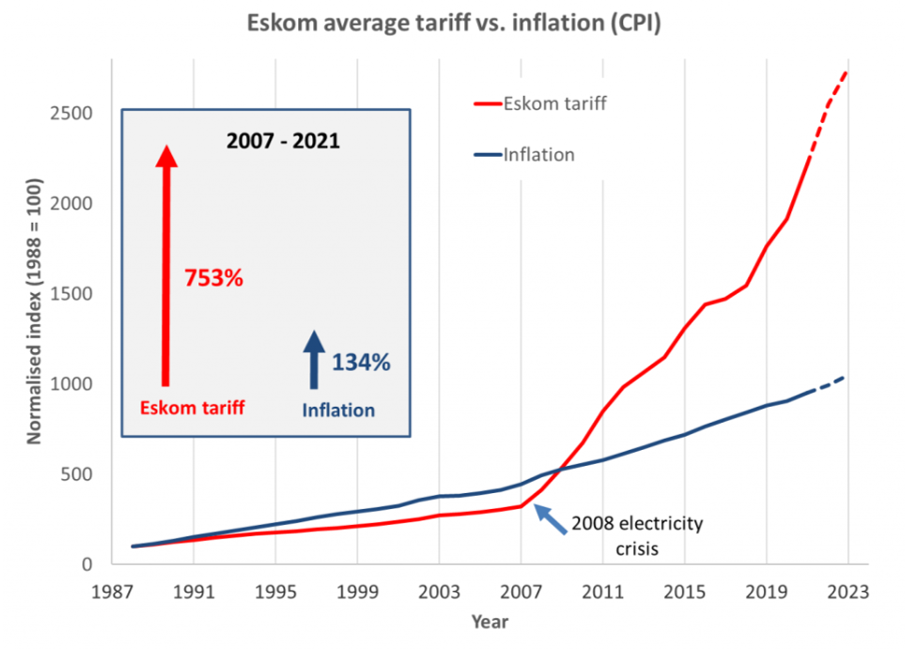
Transnet, the state rail company, once globally competitive, is almost defunct. This has meant more and more goods being transported in lorries on South Africa’s crumbling roads. The chart below depicts the decimation of our rail network by share of tonnes carried compared to other transport methods.
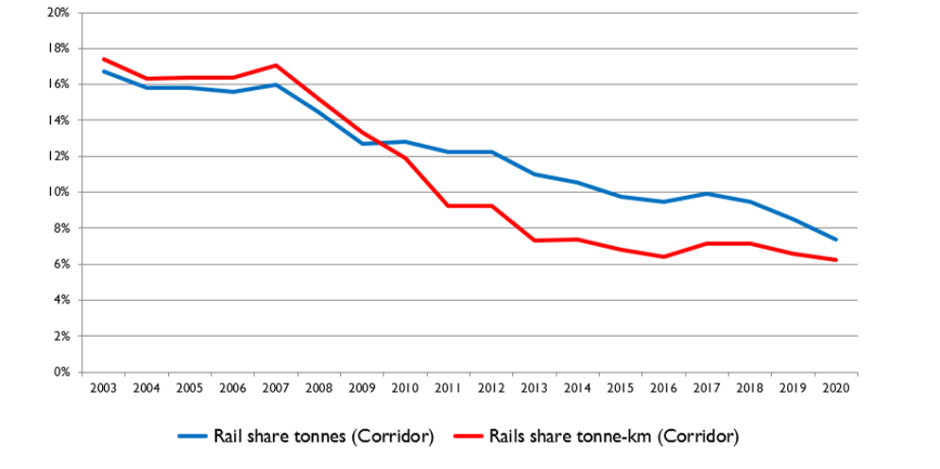
Despite multiple injections of billions of rands from taxpayers, South African Airways is also defunct. More or less everything the ‘Government of the people’ has touched has collapsed.
It hasn’t been a minor collapse either. In its heyday, South Africa was quite something. Detached from the developed world by geography and, for spells, by apartheid sanctions, we did impressive things. As the Afrikaners say, “Boer maak n plan” (“The farmer makes a plan”). We built our own nuclear bomb (good or bad, a technical feat). Dr. Christiaan Barnard performed the world’s first successful heart transplant in 1967. Our athletes travelled to Augusta National, Wimbledon and Lord’s – sometimes defeating the best of the best.
There were terrible abuses, too. Sharpeville, Robben Island, and the everyday human rights denials that don’t get names or memorials. I have no intention of minimising or re-litigating those now. I’m tired of the ‘two wrongs make a right’ approach to ethics and government. One form of racism can’t fix another form of racism.
Despite a previously thriving country falling apart all around them, politicians, corporate leaders and activists find plenty of time and money for all the petty woke causes that rich nations embrace. We have a Minister for Women, Youth and Persons with Disabilities. Our political elites seem to adhere to Douglas Murray’s definition of feminism: women are equal to men in every way, and, somehow, magically better. Banks self-flagellate over microaggressions. Journalists admonish men for toxic masculinity. The trans movement is embedding itself in schools. And all of these institutions embraced Covid lockdowns, to “take care of the vulnerable among us”.
The pinnacle of woke praise is reserved for ‘ubuntu’. Translated as “I am because you are”, this is an indigenous philosophy that puts collectivism on a pedestal. Alongside some admirable elements, ubuntu treats collectivism as an unquestionable good. Plenty of proponents wield it to rebuke individualism as some type of extreme European evil. I have argued that “individualism is the original ubuntu”, pointing out that the way to build a strong society is by harnessing the ambitions of self-interested individuals, as per Adam Smith. But it has fallen on deaf ears.
Wokery is everywhere
I’m getting very down on my home country, but a similar form of decay has taken root everywhere. My trip to London last May was my first visit to the U.K. since spending six months working there in 2003. I was somewhat taken aback to see tube adverts warning that looking at someone on the train can amount to sexual harassment, waiters inquiring about allergies and apologies for slavery posted all over the Bank of England Museum. It was like being back home.
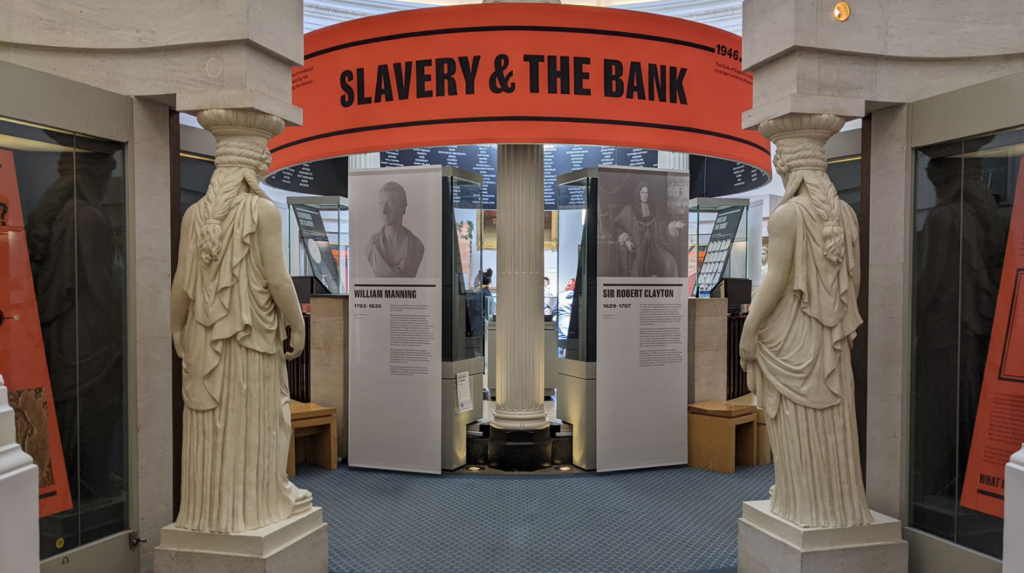
I came away with a bad impression. The police in Britain seem terrified of investigating people who happen to be Muslim for fear of being called racist. Corporates are bending over backwards to hire people that give them virtue-signalling bragging rights. People appear to have leeway to be racist and sexist, as long as this is directed at straight white men. Fossil fuels are demonised with hardly a moment’s thought for the incredible benefits of cheap, reliable energy from hydrocarbons. Bureaucrats proudly divert scarce resources into campaigns advising us not to trip over steps.
U.K. firms aren’t forced to submit expensive BBBEE scorecards to secure Government contracts, as is demanded in the former colony. However, the social pressure is there and can be just as powerful as statutes. It would be unthinkable to see an advertising campaign on the BBC that lacked an obvious casting strategy to ensure an ‘appropriate’ racial mix. Politicians hail plans that benefit black school children – and ignore the data showing that working class white boys are struggling. Ever more money is spent on digging up bygone racial offences and paying ‘reparations’. And universities increasingly debase themselves chasing ‘diversity’ – that is, a very particular form of diversity that ignores, and often shuns, diversity of thought.
It can happen to you
If you still reckon ‘it couldn’t happen here’, I offer a cautionary tale. In 2019 I travelled to Harare to write a story about the state of Zimbabwe’s economy. Like all South Africans, I grew up with anecdotes from earlier generations about how prosperous the old Rhodesia was. Thriving tobacco plantations, efficient mines and a booming tourism industry. The Harare I witnessed resembled a Netflix zombie apocalypse film. I felt great sympathy.
I described the drive from the airport to the capital city like this: “Dotted alongside the highway are figures spread out for hundreds of metres on each side, hoeing, picking and planting. But they aren’t farmers. They’ve pegged off a patch of earth no bigger than a comfortable lounge to grow crops.” There was no cash in the ATMs, the roads were almost impassable, and a glass of wine in a hotel bar was $10 (U.S. dollars, that is – the Zim variety is almost worthless).
Former President His Excellency the Honourable Comrade Robert Gabriel Mugabe wasn’t exactly woke. But he was collectivist. He was retributive. He shunned merit in favour of identity politics. Those are the heart of wokery.
Long before my recent visit north of the border, I experienced Zim’s fall in real time, from 2,500km away, while an undergraduate at the University of Cape Town. A number of my classmates were Zimbabwean refugees. Some were children of the country’s black elite. Many were white children of farmers who’d been booted off their land (violently or otherwise). They didn’t like talking about it.
Dads often travelled to Zambia to work as farm managers. Moms often found employment as teachers or nurses in Britain, Australia or South Africa. Some families thrived despite the destruction. Some thrived because of it, getting into bed with Mugabe’s ZANU-PF. Others just found ways to get by.
Yes, there were racist horrors in South Africa and Rhodesia/Zimbabwe. Things that needed to change. But the collectivist, vengeful ‘solutions’ we are experiencing are cures that are worse than the disease.
To the barricades!
Don’t assume that someone powerful is tending the fires. I have argued that the embrace by South Africa’s CEOs of diversity, inclusion and equity (DIE) has brought the country to the brink of collapse. The same criticism applies to many bureaucrats, politicians, headteachers and vice-chancellors. As soon as the activist woke minority demands compliance, the majority falls in line. If you have a weighty mortgage and children in expensive schools, you have to feed the machine, or it will feed on you.
There are many of us who have more freedom than that. We are defending our rights in big and small ways. Vivek Ramaswamy, a successful biotech entrepreneur and investor now running for U.S. President, is fighting wokery. Public intellectuals like Jordan Peterson and Gad Saad have large, global audiences, all of whom are sick and tired of being treated as totems of a hated race or gender. Publications like the Daily Sceptic give us a voice.
Many South Africans are standing up against harmful forces – no longer willing to pay taxes into Lysenkoist pits of climate hysteria; no longer tolerating their kids being told at school that sex is a spectrum; refusing to be bullied. We’re getting off the grid. We’re telling the truth. We’re ‘state-proofing’ our businesses and our lives. We’re forming civil organisations that conduct strategic litigation.
We’re winning victories too. On a tiny scale, I campaigned against a school that included Pocket Queerpedia on a public reading list. This free book speaks glowingly about sexual reassignment surgery, ignoring nuance, counter arguments and risks. School leaders agreed it was inappropriate and removed it. On a larger scale, civil organisations are defending our rights in court. Our judicial system is a beacon of hope. Last year, Sakeliga obtained a court order demanding the release of Government records on Covid lockdowns. Solidariteit just announced it will stand up against the new Employment Equity Act. It pointed out that this “legislation grants draconian racial powers to the Minister”.
At a personal level, I am one of the growing number of Johannesburgers that, as the Financial Times reports, are heading for greener pastures in Cape Town – ‘semi-grating’, as we call it. The Western Cape Provincial Government is run by the Democratic Alliance, rather than the ANC. The DA is deeply flawed, but far better than the alternatives. If you visit, take a walk on Table Mountain. It’s unlikely you’ll spot a scrap of litter. Potholes are a rarity and there are credible local plans to escape power shortages. The trail running, beaches and wine farms are among the finest on the planet.
Moving to better managed cities is a good interim solution. However, we can’t hide forever. Not on the southern tip of Africa. Not in London, Sydney or New York. Nations fail. Only rarely is it the result of bombs and invading armies. Far scarier are ideas and neighbours. I’m not sure if Joburg or South Africa can be saved. It is worth trying. But Britain is decades behind my homeland on this ruinous path. You folks have time to stop this and turn it around.
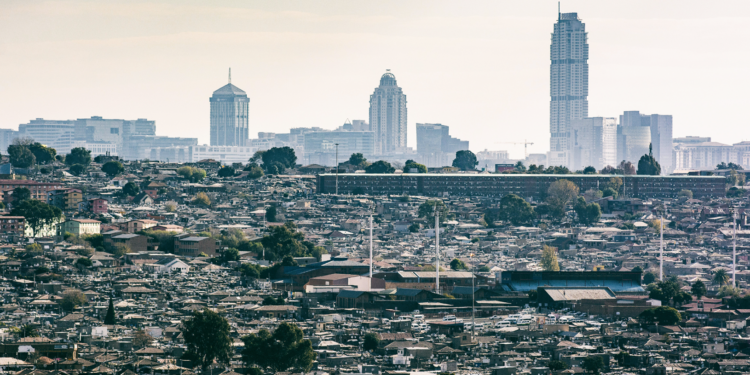











To join in with the discussion please make a donation to The Daily Sceptic.
Profanity and abuse will be removed and may lead to a permanent ban.
I was going to say “This is almost beyond belief” but unfortunately it isn’t in these insane times. Has whoever is in charge of Dahl’s estate had any say in this? Or are they ultra-woke too and go along with it?
In any case, selling these books as being “By Roald Dahl” is now simply a lie.
According to the Telegraph article, the rights were sold to Netflix in 2021.
That explains everything.
Can this be challenged, because publishing rights should not encompass the ability to re-write someone else’s creation? This is not unlike the New York Times trying to re-imagine Harry Potter without J. K. Rowling.
It might still be possible to challenge on moral rights grounds yes https://en.wikipedia.org/wiki/Moral_rights
It seems like nothing is beyond belief these days.
Have they got around to Richmal Crompton yet? My personality, vile as it is, is based upon her foundation.
Funny – I never saw you as Elizabeth Bott!
OK, there’s a quantity of Molesworth mixed in.
What I read to my kid was greek myths, about Chronos devouring his children. It seemed to make him more affectionate.
Greek miths make kids tuough. as any fule gno. Fotherington-Thomas mum never tell him Chronos story. That why he sae “Hello trees, hello flowers”ect.
Medea comes to mind.
I suppose it’s nothing new, in that our school edition of My Family and Other Animals had dropped the line “that bloody boy’s filled the sodding bath full of bleeding snakes,” and edited out the Good Ship Bootle-Bumtrinket altogether. But there is a difference between a mild editorial hand for kiddies and a complete Bowdler job.
The interesting question is Will there, at some point in time, be firemen tasked with burning old books? Eg, I have a somewhat lengthy German history of battles of the first world war at home whose content is nowadays at least borderline illegal in Germany and Austria (and in Austria, not so borderline). For instance, one of them expresses the wish that the Germans (both those living in Austria and those living in so-called Germany) will hopefully unite in future to become invincible in war. That’s the kind of stuff people can go to jail for in the Austria of today.
While I think it’s important to keep such literature, isn’t there a big difference? The thoughts expressed by the German National Socialists were put into practice, whereas Roald Dahl fought the Nazis and he does not write as an ideologue. We seem to be in a situation where the unprecedented peace that has followed WW2 has made quite a few people unable to work out what is friend or foe, because they have no first hand experience. All previous generations for all of human history experienced plague, war and starvation. The recent generations are, in the majority, the first to have no experience of any of the primary challenges that their ancestors faced.
Why do you immediately come up with Nazis once something is mentioned which was the perfectly normal state of affairs (Austria being a part of Germany, originally a part of the duchy of Bavaria which got separated out for dynastic reasons) since about 936 until – again for dynastic reasons – this ceased to be the case in 1871. This useless split would have ended in 1918/19 if the right of the self-detrmination of peoples had been meant to apply to – well – peoples and not just Serbs and Czechs.
Better start training firemen if you want your lies (Nazi thoughts !!37) to prevail.
They really put the “Reich” back into Osterreich!
Ok, I’m going to be controversial here.
I’m saying:
Good.
I read all of Dahl’s books as a kid and enjoyed them all, I think. Years later as a parent I read them all again as bedtime stories. I found them to be xenophobic, misogynistic, chauvinistic, jingoistic and, worse than all that, mean-spirited, elitist and just not very good. This is one occasion when I’m happy to let the thought police do their work.
Why did you read them all again if you hated them?
Do you think everything you hate should be destroyed? If you do, you’re a barbarian. A civilised person would want to leave the books intact but put warning reviews for other PC foreigners on Amazon.
Because I enjoyed them as a kid, I think I said that. I don’t want them destroyed, I just don’t care that they’re being edited. And I stand by what I said, I think Dahl was not a particularly nice person and doesn’t deserve to be the national treasure we’re supposed to think he was. Just because the woke cultural revolution is abhorrent and stupid, it doesn’t make the aforementioned isms right for children’s books.
That’s a pretty complicated way of stating that they were written in the middle of the last century before all these really abhorrent isms of today were invented. For even more horrors for the modernistic mind, try Grimm’s fairy tales. They’re even burning evil witches in there. And – now the absolutely incomprehensible – the woke spiritus rectores read all of this stuff in their childhoods. Clearly, without the completely -istic(!) Roald Dahl, they’d never have turned into the man-hating monsters they are!
If you think that’s not what your children should be reading, then, don’t buy them these books. But that doesn’t mean you’re authorized to destroy them so that other people also cannot read them anymore.
You failed to mention the glaringly obvious fact that the woke/trans extremists hate women too ( think that traitorous Sturgeon creature ) and want to erase our sex, rights, identity and role in society. Just the fact certain imbeciles cannot even define what a woman is should be a fairly big clue about what they think of us. The two defined sexes are to be obliterated and replaced with non-binary, gender-fluid other-worldly beings apparently. And I thought men wearing make-up in the early 80s were pushing the envelope! …I am of course referring to the music industry back then. Many singers/artists had bigger hair and more slap then women but they definitely were not all “batting for the other side” or trans, in my opinion.
…I am of course referring to the music industry back then. Many singers/artists had bigger hair and more slap then women but they definitely were not all “batting for the other side” or trans, in my opinion.
Back then, male rockstars were doing it to prove they were soooooo masculine that they could get away with it without having their masculinity questioned. Or something.
I don’t want to destroy or ban them (or any other work). I don’t care when they were written – misogyny and xenophobia are unpleasant things to read to children. He very clearly didn’t think much of foreigners or women. So I’m not sorry that his works are now being edited by morons, I don’t see them as treasures I see them as derivative children’s books with nasty undertones.
Don’t throw the baby out with the bathwater – just because we live in the age of woke, it doesn’t mean we shouldn’t challenge discrimination. Those isms were not invented by millennials 5 years ago.
The future is what happens from now on. Because of this, it can be influenced in some way someone believes to be beneficial. The past cannot. And cries that it must be censored because people saw things differently back then than other people see certain things today are always wrong.
By editing them like that, they are being destroyed.
Blasphemy! Actually I think if you read pretty much anything from previous centuries by our big name authors you could say the same thing. Even things written by well-known female authors, and this is because it’s a reflection of the era and the social norms and attitudes therein. For instance, to find something written by Dickens, C.S Lewis or even Shakespeare offensive nowadays is just plain daft and ironically is offensive as well. Our literary greats should be left the chuff alone, otherwise it’s a slippery slope and all authors from years gone by are fair game.
Actually I think if you read pretty much anything from previous centuries by our big name authors you could say the same thing. Even things written by well-known female authors, and this is because it’s a reflection of the era and the social norms and attitudes therein. For instance, to find something written by Dickens, C.S Lewis or even Shakespeare offensive nowadays is just plain daft and ironically is offensive as well. Our literary greats should be left the chuff alone, otherwise it’s a slippery slope and all authors from years gone by are fair game.
Ha ha! I know, I can tell from all the down thumbs! I don’t want to ban or censor any book and parents should read to their children whatever they think is right. I’m just saying that when re-reading Dahl’s books to my kids, I found them unpleasant. They felt misanthropic, classist, and yes – misogynistic. This was before the woke thing happened. There are plenty of his contemporaries whose works are not guilty of such things; I don’t think he liked people.
Incidentally, David Walliams, his wannabe supposed successor, is in a good position to take the mantle, because he’s also misanthropic and classist
The romance (politely put) between Lydia Bennet and George Wickham in Pride and Prejudice can pretty much be regarded as blueprint for liberating modern relationships — woman wants sex-life and therefore, joins up with man who wants one as well. The characterisation of both as morally inferior beings who end up sort-of salvated by a proper marriage ought to count as misogynistic for the standards of today.
Buy up original Roald Dahl books. But keep examples these new versions and perhaps put names against this vandalism.
“If you have good thoughts they will shine out of your face like sunbeams and you will always look lovely.”
I’m so glad that we’ve got all of Dahl’s best books upstairs, unadulterated and much loved. I’m waiting for the wokester nutjobs to start on our beloved fairy tales and literary icons like Hardy and the Brontes. I’m sure Enid Blyton would get a ‘good’ doing over too! This insanity should be against the law, surely?!
This insanity should be against the law, surely?!
The only art, literature, sculpture, music and architecture that would be acceptable to the woke would be both moronic and ugly.
Probably that “modern art” crap that looks like a blind-folded chimp was let loose with a tin of paint. I like art that actually demonstrates skill, and charging thousands for a splodge and a squiggle isn’t it. A prerequisite for exhibiting at an art gallery should be to answer “no” to the question: Does it look like a toddler created it?
As Andy Warhol famously said, “art is what you can get away with”, lol.
I don’t think characters from the comics I read as a child would be spared from all this nonsense. How would Billy Bunter (The Fat Owl), Desperate Dan (a huge cow pie eater) or Keyhole Kate ( a nosey parker) be altered – or allowed?
I’m quite happy being a Boomer.
Well they’d have a field day with The Viz! The Fat Slags were a personal favourite of mine…
The Fat Slags were a personal favourite of mine…
Is Viz still any good? Mr Logic?, Black Bob’s binliner, and everything? Must renew my subscription.
Haha yeah, those two and Sid the Sexist, Big Vern and the letters page.
 Used to get the annual – every year funnily enough – but haven’t for a while now. Not that I’ve grown up at all…
Used to get the annual – every year funnily enough – but haven’t for a while now. Not that I’ve grown up at all…
“Lenin allegedly said: “Give us the child for eight years and he will be a Bolshevik forever.” That could easily have been the motto behind this new vandalising of Roald Dahl’s oeuvre.”
St. Ignatius of Loyola would agree, as he said something quite similar as well.
That’s the real meaning of, “the hand that rocks the cradle rules the world.”
Did Lenin copy Aristotle’s phrase of “give me the child until he is 7 and I will will give you the man”?
Woke = sleepwalking into tyranny
Maybe soon Dahl himself will be edited out and another person named as author?
The Woke censors think they are infallible, can never be wrong and have the ‘Truth’.
Like zealots they want to destroy and censor other ideologies and want only their ideology to be worshipped.
Finding it funny that under an article about censorship 8 comments have been censored! LOL Still shows ”35 comments”… curious..
So in the warped world of woke a woman is only worthy is she is a top scientist or running a business.
Stand in the Park Make friends & keep sane
Sundays 10.30am to 11.30am
Elms Field
near Everyman Cinema & play area
Wokingham RG40 2FE
These people have no souls, except when it, he, she, them begins with “R”
Woke is the culmination of a trend long in the making. I have a satirical book from several decades ago called “Politically Correct Bedtime Stories”, which is a collection of fairy tales rewritten in exaggerated PC lingo of the time. Interestingly, titles it featured such as “Snow White and the Seven Vertically Challenged Men”, would themselves not even get today’s woke stamp of approval and would have to be re-titled “Snow Caucasian and the Seven Vertically Challenged Sperm-Givers”!
In any case, the book was intended, and understood, as a satirical JOKE (Remember those?), forewarning of the kind of sanitizing of language that we see trending today in our linguistic milieu, edited as it were by the woke missionaries.
Nobody actually has to do this – there is no legislation providing that publishers must edit all meaning and humour out of their material. Leave literary material as the authors intended and you’ll probably make much better sales too! “Go woke, go broke” applies to Puffin as well.
Puffin? The Twits…
What happened to copyright laws? Imagine if I were to change a few notes and passages in a Beethoven Sonata. it would no longer be a Beethoven piece would it? Why is it any different here?
I dare these Stasi idiots to redact Mein Kampf! LOL